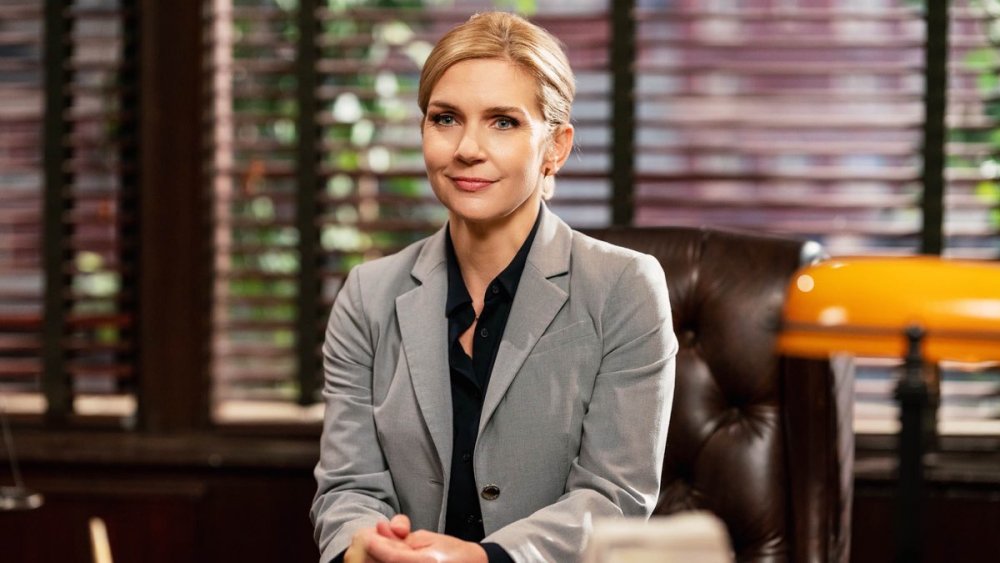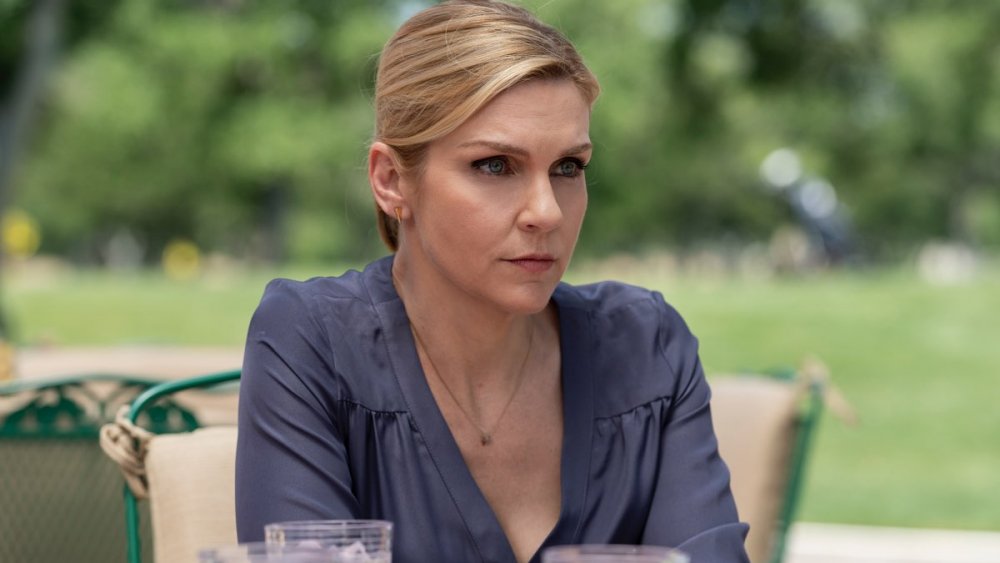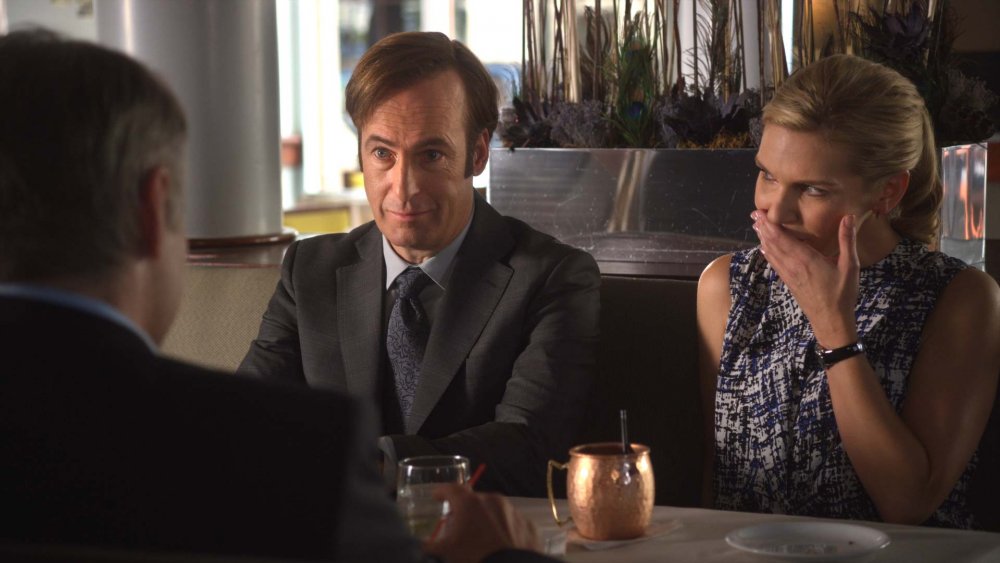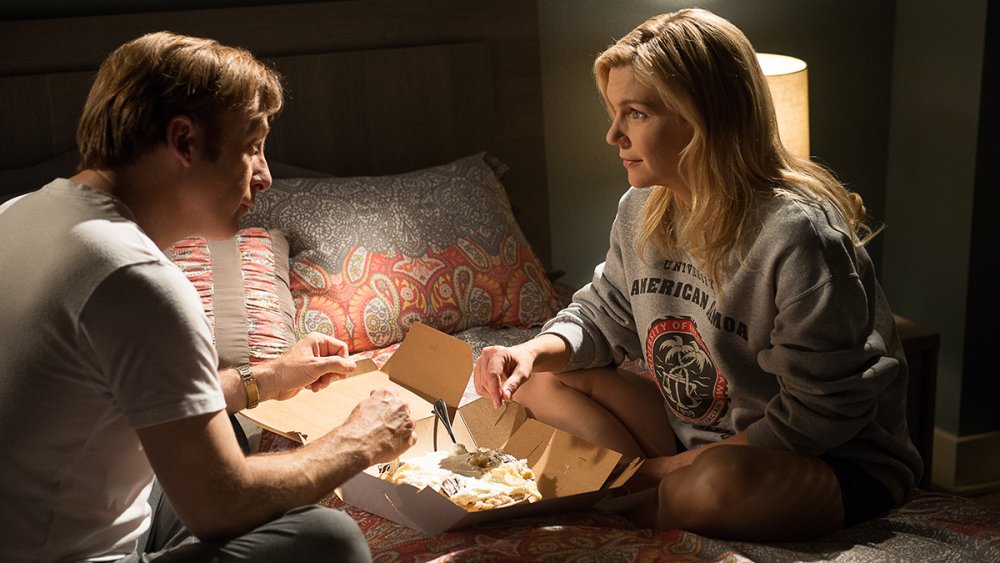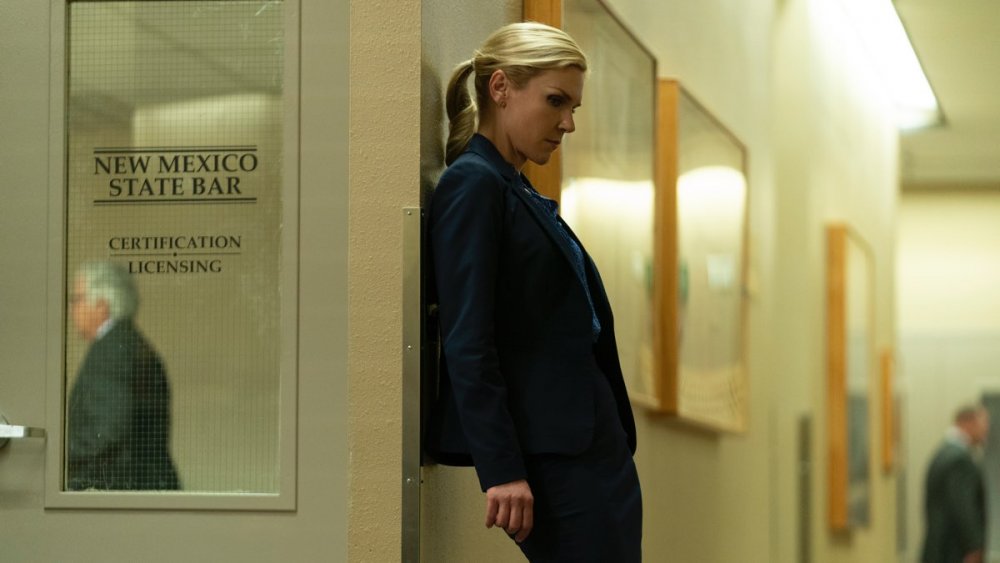Better Call Saul's Rhea Seehorn On Bringing Kim Wexler To Life - Exclusive Interview
Ask anyone who watches Better Call Saul and they'll tell you the same thing: Rhea Seehorn, who plays Kim Wexler, is the series' MVP. Over the past five seasons, Kim has gone from a supporting player to Better Call Saul's heart and moral center thanks largely to Seehorn's restrained, nuanced performance, which many critics consider one of the very best on television.
In fact, Kim is such a well-realized character that it's easy to assume she emerged fully-formed from the minds of Seehorn and Saul's co-creators, Vince Gilligan and Peter Gould. As it turns out, that couldn't be further from the truth. In Looper's exclusive interview with Seehorn, she revealed just how little she knew about Kim when the show began, how she found strength in Kim's silence, and why Kim continues to put up with Jimmy McGill's nonsense.
Seehorn has lots of fascinating insights for Better Call Saul fans — just make sure you're caught up with the show's current season first. Our discussion contains a few big spoilers.
How Rhea Seehorn got into Kim's head
You've been on the show for a number of years, but when you started, you were joining some cast and crew who had been living in the Breaking Bad world for quite a while. What was it like being one of the new kids?
Well, at first, it was pretty daunting. I was a huge fan of Breaking Bad, and then individually the work that people were doing on it, whether it was the acting or writing of individual scripts, the way they directed it, the way they edited it, Vince Gilligan and Peter Gould's show-running effort. It's just the way they create things. It was a bit daunting while being thrilling at the same time.
I wasn't entirely sure what I'd get when I got there, but even at the beginning with the auditioning, with the screen tests with Bob and meeting Peter and Vince there, as well as other executive producers like Melissa Bernstein and Tom Schnauz and Mark Johnson, it became readily apparent that they were going to not just be receptive of letting new people into the sandbox to play but were excited by that.
Better Call Saul lives in the universe of Breaking Bad, obviously, but was meant to be its own thing. It wasn't meant to be Breaking Bad season six. When I got there, I was met with a crew and a team of people that felt the same way. People were really lovely. It wasn't like some club that you felt left out of.
How much did you know about Kim when you started?
Very little. I had the scene, I believe it's in episode three of season one, where Jimmy calls me late at night wanting to get information about the Kettleman case, and then he tells me that he left a message using a paper towel. I ask, "You didn't do the sex robot voice, did you?" It was a very funny, late night phone call scene.
But at that time, they still didn't know. What exactly is their relationship? What's their history? What's going on here? By the time I got to set, I knew that she was a lawyer. By the time we shot the pilot, after I got the part, they did inform me that she's a lawyer, that they have known each other for 10-plus years. In what capacity remained to be seen, but that they were each other's confidants in the truest sense of the word.
It didn't need to be defined by was it romantic, is it romantic, will it be romantic? It was sort of, there's a deeper friendship and honesty between the two. They came up together through the mailroom. Kim was such a whiz that HHM offered to pay for her to go through law school, and she started to build her career. That was about it.
Then, we shot the scene where he comes in doing the Ned Beatty "You will atone" speech. We end up in the parking garage, and we had one sentence to share. That was the only line I had, but it's still one of my favorite scenes. It says almost everything you need to know about Kim.
You've said in other interviews that you're not much like Kim. Are there aspects of the character that you do relate to?
I relate to wanting to believe that if you work hard enough and are smart enough that everything will be okay. I relate very much to hanging onto that almost a bit too much, and to wanting to be self-sufficient and finding solace in that. I absolutely relate to that idea.
One of the first things I have to do when I go back each season and I've been away from the character for a bit is to start by just sitting on my hands and thinking about being still. I know Kim speaks with her hands sometimes, but she's mostly a still person. She's very still in her face. I'm a goof and a dork. Everyone can figure out what I'm thinking. I can't hide anything in a conversation.
I really wanted Kim to have this stillness, and that arose out of the economy of language they gave her in those first couple of episodes. I thought, well, she's clearly a very strong, interesting, intelligent person, and they hired me based on the subtext they saw me putting into the audition. So, I think they're on the same page as me, that she doesn't seem to be somebody who is snowed by Jimmy. She isn't someone who is really quick to contribute to a conversation. So, why be that efficient and economic about your speech?
I just thought, well, let's do deductive logic to make this character. If you're that particular about what you say and when you speak, maybe you also don't like people to know your thoughts. Maybe you're economic with your gestures and your facial expressions. It just became this position of power for me, for the character, versus the position of weakness. I could just choose not to speak. She just observes these people until they hang themselves. I wish I had the ability to not desperately fill silences, and to not constantly want to make sure everybody in a room is okay. But that's from my upbringing, and Kim's is from hers.
Why comedy stars are such a great fit for the Breaking Bad universe
Before Saul, you were primarily known for sitcoms. Bob Odenkirk became famous doing sketch comedy. Michael McKean was known for his comedies. Bryan Cranston was known for Malcolm in the Middle. Why do you think that comedy stars are such a good fit for this universe?
I don't know. It's been said for a long time that people who do comedy, particularly comedy that is sort of twisted or dark, which I did a lot of on stage before I did sitcoms. Michael McKean, definitely that sort of darker, twisted kind of stuff. Bob obviously.
Michael McKean and I actually did a pilot together that Christopher Guest directed from a Mitch Hurwitz script, which was called The Thick of It. It was years and years and years before Veep. It was sort of the first attempt at adapting Armando Iannucci and In the Loop.
It was based on the British show?
It was, but it was done with a Congressman. We had a great time doing it. It just went through other iterations and stuff and became the brilliant show [Veep]. It wasn't a one-to-one ratio. It was totally different people by the time it went down.
It's been said before, people who do comedy, especially darker character comedy, like wounded and damaged character point-of-view comedy, tend to have it in them to understand the drama side. I've seen Bob break down a script and I've talked to Michael McKean about script analysis and scene study. It's totally the same method as doing drama.
I did drama on stage as well. It just so happens at my first job in L.A. was a sitcom. Then I got typecast as a sitcom actress. I was grateful to be typecast as anything, because that means people are calling me, but I was sort of perplexed because in theater that wasn't really a thing, where you had to choose one.
So, I don't know. I think most people that are doing that kind of comedy are already looking for the tragedy in it. They're the same people that, when they're doing tragedy, understand the humor in our own foibles and the irony in a lot of the darkness of life. Not that you're laughing out loud, but it's the state of humanity that you're understanding. It's a strange thing, because it doesn't always go the other way. Comedy can have timing issues that not all people who do only drama would get. It's an interesting equation.
The other thing I've noticed you say, because everyone always asks you "What's going to happen to Kim?" is that you don't know. The writers don't tell you. Do you have a favorite fan theory, though, about where Kim's going to end up?
I like the humorous ones because they're more playing a game of "What's the most fantastical thing that could have happened?" Like, people talking about inserting her in Breaking Bad in a weird Rashomon, Adobe Photoshop-style. Like scenes where like, oh, she's just off screen. She's in the parking lot, waiting. Being in the back of Cinnabon with a hairnet on, you just never pan the camera over far enough to see her. It makes me laugh. So, I enjoy those.
I used to sort of spend a lot of energy worried, reading scripts in my bed for season one and two and frantically skipping through them, trying to figure out, oh, I live another day.
Eventually, you just have to let it go and put your hands up. The fact that I only get the scripts one at a time — they're not even writing full seasons at a time; they like to see a little bit of what's happening on set and where certain storylines are flowing — you have to let go of all of that. You have to let go of wanting to know what the end is, or wanting to know what's behind what you're doing now.
It's been a really big gift, actually, because I'm one of the only characters who is not in Breaking Bad, or doesn't have an end that we know. I have to live in the present moment because Kim — well, actually, none of the characters have seen Breaking Bad. So, when I'm making decisions about how Kim feels about things Jimmy is doing, it's really good for me that I have to take it a page or a moment at a time, because she can't see into the future. So, in that way, I decided a while back to not dwell on the actual specifics of how she goes out, if she goes out, in what state she goes out.
At the end of the day, I feel very differently about it now than I did in season one, because they write characters who are not immovable objects in space. Kim is also on her own trajectory. So, the Kim we met in the pilot, if she met the Jimmy that you saw in [season five] episode seven, I don't think that would work. She has changed and I have changed. We have changed each other. We have changed ourselves and we've changed together. So, it's a much bigger picture now.
Why Kim stays by Jimmy McGill's side
This season we've seen Jimmy get more and more brazen with Kim, and she's not just still putting up with him. She married him. Where do you think the line is?
Well, it certainly keeps moving, and that's always troubling. It's been troubling for me from the beginning of her character. Likewise, her compartmentalizing of her own behavior, I find very troubling. She does it as much with her own behavior as she does his. I think they're inherently related, this moving of the line of what she'll abide. Way back in the awesome "Squat Cobbler" episode, where he made up evidence to hold someone to a crime, she said, "You know what? I don't want to hear about it." Now, we're at a place where she says, "I can only deal with it if you tell me everything."
Part of that is wanting their relationship to be honest, because she's such a solitary person. He's the only person she's herself in front of, really. So, hanging on to that makes sense to me, and the fact that she has to keep moving the line of what she'll accept.
She's also moving the line of what she thinks, sometimes quite egotistically, she can handle. I think she thinks that if she can have all the information, she can navigate it, whether it's coming up with a contractual way out of having to testify against him by marrying hi, or insisting that, if she knows all the facts, that she'll somehow be able to choose what to be a part of and choose what not to be a part of. It's absurd from the outside, but when I think about Kim and her need to make order out of chaos and this need to work herself out of every problem, that there must be an efficient work solution to every issue, she's looking at it that way.
At the same time, she is at this horrible crossroads where she is forgetting that law is black and white and not gray. It's not the same as moral and immoral, as Peter mentioned to me a couple of times this season. She thinks she can put her finger on the scale of justice, just a tiny bit, to make the "right guy" win. That is not going to end well for anybody. It's been a fun journey for me to look at that. She's not a martyr. She's not a saint. She really did think practicing law was the way to bring justice to people.
If you read Scott Turow's famous book One L — it was published in 1972. It's the first thing I read when we started doing the series, because it's the first time that this guy did this very candid memoir of Harvard as a Harvard first year law student. What he mostly talks about is how practicing law and studying law changes you. Some people, some of the people with the best grades in the class, ultimately decided they couldn't do this emotionally because it alters the way you have to look at things. You cannot look at them morally and ethically. You must look at them legally.
So, I think that's the line that keeps moving for her. She knows it's wrong — which is why you see her in the first episode of this season almost throw up in a stairwell — but she somehow thinks the greater good is being served. I think that is being transferred on to how she's dealing with Jimmy as well. The line keeps moving. "Okay, well, that's not good, but we can make a little bit more room over here and then push this wall a little bit to the left, and we can somehow make it right in the end."
The biggest lessons that Rhea Seehorn has learned from her time on Better Call Saul
It's such a secretive set. Were there any plot twists that you were just dying to tell people, but you couldn't?
The car accident, I kind of wanted to tell. I didn't even tell my fiancé. He knew that I didn't fly home after that episode, so I must have been in more episodes, but he didn't know if they were flashbacks after that. He didn't know if it was, like, is she in a coma for the rest of the season? So, he jumped. He jumped when he saw the car crash. Especially the way they edited it. It's so jarring. I did want to tell people about that, but I couldn't.
The first time that Jimmy and I scammed someone together. That was episode 201 [second season, episode one], I think. I kept being interviewed before that season. People were just like, "Do you think she'll ever be like that? Do you think she'll ever do a scam?" I was like, "I don't know." So yeah, that was hard to keep secret.
You've wrapped this season, and the next season is going to be the last one. Looking back, what's the biggest lesson you've learned from your time on the show?
I think probably two things. One thing, which you should be doing always as an actor, but it's been monumentally enforced on the show, is to play the present moment. Play what's happening now, not what's happening in the future. Play the given circumstances of what led up to right now and what's happening in the moment. That's much harder than one thinks, but it is very informative for a scene.
Secondly, to trust myself more. That is a result of the directors and the writers and my scene partners on this show. When they hand me scripts and some of the scenes, sometimes they're scenes from this season that you've already seen, I'm like, "Oh, wow, so today is the day that the jig is up. You have the team of geniuses. No, no, it's you. You're the one that couldn't do this. "
I took risks in my acting that I haven't taken a while because I was encouraged to do so. Even planning on being silent and playing it extremely small and showing very little on my face was a massive risk on television because in many shows, that's a no-no if we can't figure out what the hell you're thinking. They constantly encouraged me on the show. They were like, "No, just decide what Kim's thoughts are." Both they and the incredible fans will stay with you, and then they do. That's been a joy I can't even explain.
